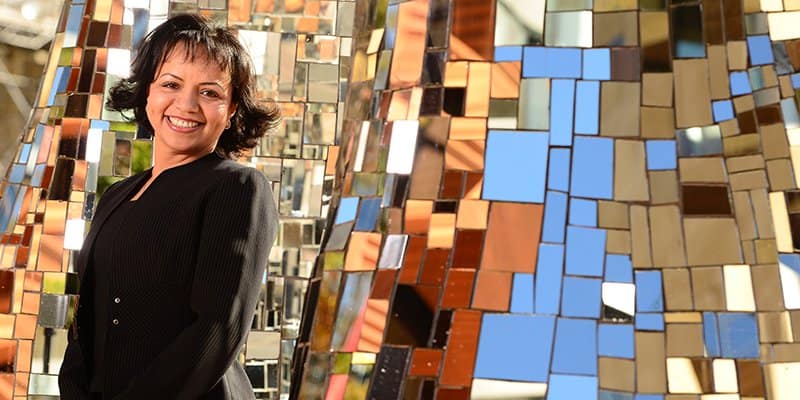Faculty Spotlight: Dr. Soumia Ichoua

Conducting research in many varied fields is Dr. Soumia Ichoua’s passion. “I’ve always wanted to be a scholar, try to conduct research that has an impact and impacts students as an educator as much as I can,” said Dr. Ichoua, an Associate Professor and Director of Research for the College of Business at Embry-Riddle Worldwide. “I’m lucky to be in a field — Operations Research — that allows you to work on different real-world problems that are relevant to society.”
While she has only been at Worldwide since February 2012, Dr. Ichoua is already being recognized for her diverse projects.
They range from optimizing the use of renewable energy sources, to improving the efficiency of humanitarian logistics when responding to large-scale disasters such as Hurricane Katrina and the 2010 earthquake in Haiti, to managing air traffic more efficiently during inclement weather.
The native of Morocco is also one of just two professors at all of the Embry-Riddle campuses who are 2012-13 Core Fulbright Scholars.
“It’s a wonderful experience,” Dr. Ichoua said. “Professionally, it allowed me to foster international collaborations with Germany, one of the world’s top innovators and users of renewable energy. At a personal level, it is a great opportunity to discover a new culture, new ways of doing things, and much more.”
Core Fulbright is the U.S. government’s top competitive program for international educational exchange, and it provides approximately 800 teaching/research grants to U.S. professors and professionals in a variety of fields.
For her Core Fulbright project, Dr. Ichoua is working with colleagues at the University of Applied Sciences– Emden/Leer to optimize the use of renewable energy sources for small and mid-sized manufacturing companies in Germany. Dr. Ichoua’s project involves the design of a consistent production schedule that accommodates uncertainty in energy availability when dealing with natural forces like wind or the sun.
“How do you decide how to schedule daily production in an intelligent way taking into account fluctuations in solar or wind energy?” Dr. Ichoua said. “You have to depend on the weather, which is uncertain. You cannot take the risk of scheduling more than you can handle because there is not enough wind or sun.”
The renewable energy project is one of several interesting research areas Dr. Ichoua has been examining recently.
Earlier this year, a book she co-authored — Humanitarian & Relief Logistics: Research Issues, Case Studies and Future Trends — was published. Prior to that, she was awarded an National Science Foundation grant to investigate the design and operations of relief distribution networks using dynamic-stochastic optimization techniques.
“It’s very important to make sure when people are hit by disasters that they are getting emergency supplies at the right time and place and in the right quantity,” said Dr. Ichoua, who in December 2013 was named to the 2014-16 Board of Directors for Women in Aerospace, an organization dedicated to expanding women's opportunities for leadership and increasing their visibility in the aerospace community.
Of course, given that she is at Embry-Riddle, Dr. Ichoua is also working on a research project related to aviation — the field that brought her to Worldwide.
The FAA and other industry groups estimate air traffic to increase between 150 and 250 percent in the next two decades. To handle the expected increases, the FAA is modernizing its navigation systems to make them more efficient, going from ground to satellite-based. The goal is to improve the management and operations of the entire National Airspace System.
The goal of Dr. Ichoua’s project is to effectively manage air traffic in times of bad weather. Along with some graduate students, she is examining many factors – including flight rerouting, aircraft speed change, and whether or not to ground an aircraft – to minimize overall flight delays.
“The capacity of the NAS is pretty disrupted by the weather,” she said. “There are problems now. If demand is increased, it will be much more important.”
Whether the research is related to renewable energy, natural disasters, or aviation, Dr. Ichoua tries to instill her passion and love of problem solving into her Worldwide students.
“I like this interaction between research and teaching because you can see your research nurturing your teaching and vice versa,” she said.
Dr. Ichoua lives in Charlotte, N.C., with her husband and 4-year-old twins, a boy and a girl.
